Vintage Treasures: To Reign in Hell by Steven Brust
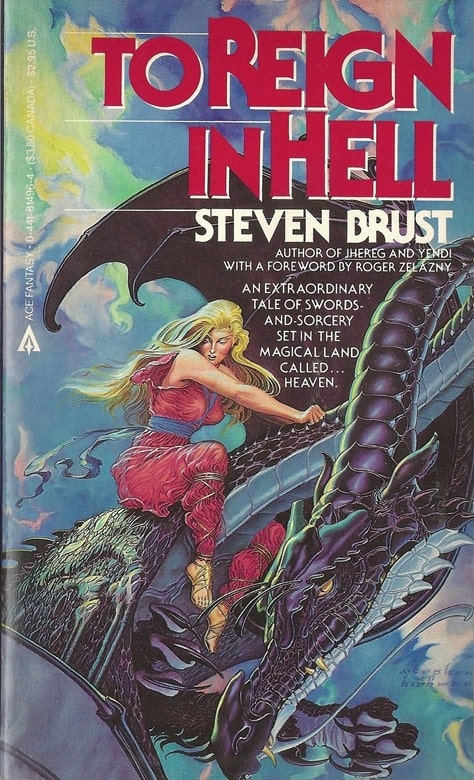 |
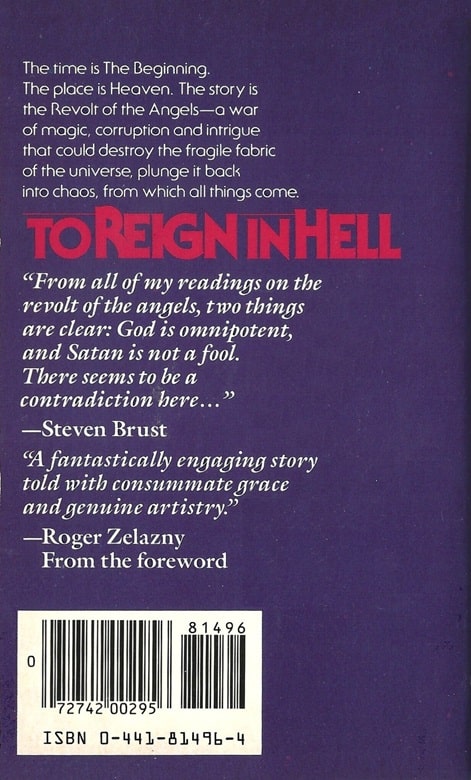 |
To Reign in Hell (Ace Books, May 1985). Cover by Stephen Hickman
In 1983 all my friends in Ottawa were talking about the debut novel by a young fantasy writer from Minnesota. The book was Jhereg, and it launched Steven Brust’s career in a major way. A caper tale (told from the criminal’s point of view) in a world of high-stakes court intrigue, Jhereg became an instant fantasy classic. As Fletcher Vredenburgh wrote years later here at Black Gate,
Jhereg reads like a fantastic and slightly off-kilter version of a Golden Age crime story. The focus is on Vlad’s ingenuity and the puzzle of how to kill the thief. That plus the witty banter, snarky sidekicks, and some action here and there kept me captivated.
All eyes were on Brust when his second novel appeared. Although most of us expected more tales of adventure set in the world of Dragaera, that would have to wait until Yendi — the first of a great many sequels in what eventually became one of the most successful and long-running series in modern fantasy — arrived a few months later. Brust’s actual second novel was To Reign in Hell, a fantasy retelling of Milton’s Paradise Lost, and it proved Brust would have an extraordinary fantasy career.
[Click the images to make it rain bigger versions.]
The first fifteen novels in Steven Brust’s popular Vlad Taltos series: Jhereg, Yendi, Teckla, Taltos,
Phoenix, Athyra, Orca, Dragon, Issola, Dzur, Jhegaala, Iorich, Tiassa, Hawk, and Vallista (Ace and
Tor, 1983-2017). Cover art by Stephen Hickman, Kinuko Craft, Denis Beauvais, and Ciruelo Cabral
To Reign in Hell has a forword by Roger Zelazny, a major influence on Brust. As he recounted in an interview at Tor.com years later, Zelazny’s classic Lord of Light was the book that made him want to become a writer.
You always get asked, “When did you know you wanted to be a writer?” And, of course, there’s no answer, or a thousand answers that are all equally valid. But I usually say, “In high school, when I read Zelazny’s Lord of Light.”
You see, until then, I had never known you could do that. I never knew you could make someone feel all those different things at the same time, with all of that intensity, just by how you used 26 characters and a few punctuation marks. What was it? Well, everything: Sam and Yama were the most compelling characters I’d come across; it was the first time I’d ever stopped reading to just admire a sentence; it gave me the feeling (which proved correct) that there were layers I wouldn’t get without a few rereadings; and, above all, it was when I became of what could be done with voice — how much could be done with just the way the author addressed the reader. I remember putting that book down and thinking, “If I could make someone feel like this, how cool would that be?” Then I started reading it again. And then I went and grabbed everything else of his I could find.
To Reign in Hell has many similarities with Lord of Light, not the least of which is its fascination with gods, tragedy, and the powerful alure of the mythic tale.
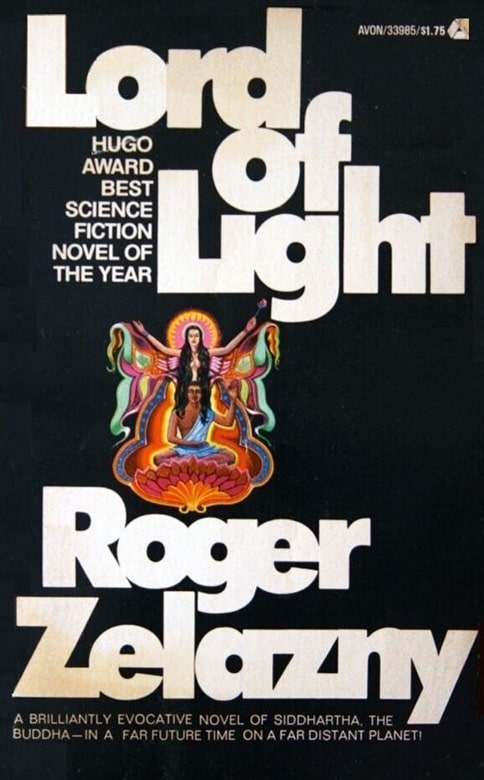 |
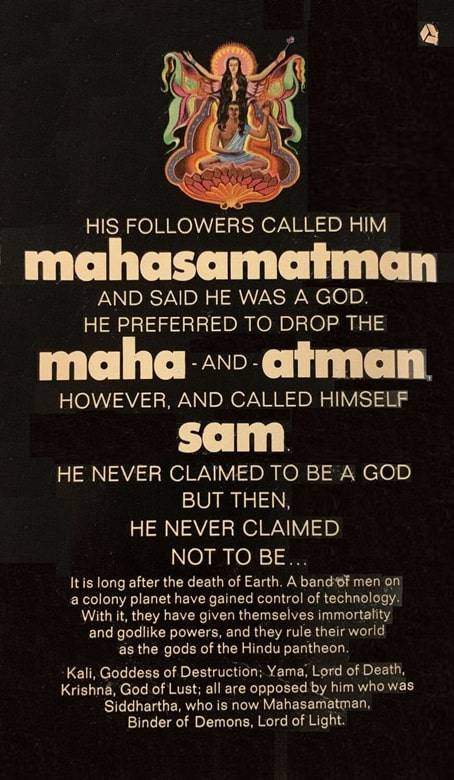 |
Lord of Light (Avon, January 1969). Cover by Ron Walotsky
Later this year To Reign In Hell will be reprinted as part of the Tor Essentials line, dedicated to bringing “science fiction and fantasy titles of proven merit and lasting value” back into print, with a much more informative blurb on the back cover. Here it is.
Originally published in 1984, Steven Brust’s To Reign in Hell is a retelling of Satan’s revolt against Heaven with much more sympathy for Lucifer and his allies.
Heaven is threatened by the reemergence of a cataclysmic event, a wave of energy that can destroy life and result in the loss of many angels. In preparation for this Fourth Wave, the angel Yaweh consults the angel Satan. A plan to build Earth, a new and larger Heaven that would be equipped to withstand the disaster, is constructed. Satan questions the plan because doing so will sacrifice the lives of other angels, much like the Fourth Wave itself threatens to do. Charged with convincing their fellow angels to lay down their lives, Satan has reservations about their right to ask for such a sacrifice. This doubt, and the questioning of ethics, opens the door for a devious figure to manipulate Satan, developing a heavenly war.
This re-examination of Paradise Lost that calls morality and villainy into question through the lens of epic fantasy is a prescient early classic with an enduring legacy and a formative text of the genre.
Here’s a sneak peek at the new cover.
To Reign in Hell (Tor Essentials, October 15, 2024). Cover uncredited
Brust shared this intriguing tidbit on To Reign in Hell on his website a while back.
My second novel, this is a novelization of the revolt of the angels. It was rather ambitious for me, and I could probably do a much better job of it now, but a lot of people seem to like it, which pleases me. I didn’t have an outline as I was writing it, and I remember getting about 4/5 of the way through it and saying, “Geez, Satan is going to win. That’s interesting.” I shrugged and kept writing to see how it came out. The introduction by Roger Zelazny amazed and delighted me. I still haul it out and read it when I’m in a funk.
A few months ago I read a fine review by Russ Allbery at Eyrie.org, and it stayed with me. Here’s the highlights.
This is the story of the rebellion of the angels, or rather the story of the events that would later be called that by the followers of Yahweh. It is, from the start, a subversive and strongly anthropomorphized account that takes everyone involved down several pegs. Brust’s portrayal of angels, archangels, and the First Ones (of which Yahweh is only the first of seven) is of creatures with human confusion, emotions, bickering, desire, and differences…
Brust’s retelling shows a painfully plausible cascading failure of communication (provoked by a rather devious and self-serving angel named Abdiel, but not entirely his fault) around the Plan. The Plan is immediately recognizable as the idea of creating Earth… However, in order to create Earth, the angels would have to leave Heaven and build in the regions of chaos, and it’s certain that in the process many hundreds of them would die…
Satan is not firmly opposed to the plan; for most of the book, he considers it an open question. But right after it’s first proposed, he asks a question: what if the angels don’t want to sacrifice themselves to build Earth? Is it right to force them to do so in the name of protecting them from later tragedy?… One of the beautiful touches of the book is that Brust leaves Satan’s question unresolved.. All Satan wants at the start is for the question to be honored and given serious attention, regardless of how it’s decided, but the mere raising of the question becomes an act of rebellion… The strength of the book lies with the reader’s foreknowledge of the outcome and Yahweh’s slow slide into paranoia and tyranny…
Brust writes some memorable character quirks (Beelzebub as a dog who speaks Elizabethan English is probably the most notable) and has fun with word play and unexpected reuse of famous lines… Beyond that, it’s a lesson in how binary ideas of good and evil grow out of something that’s far more complex and murky and how both sides of a duality can be good in their own ways. When this clicks, it’s an excellent book.
If you’re interested in exploring the work of Steven Brust, there’s a lot of resources at Black Gate. Start with Bill Ward’s excellent 2009 review of Jhegaala, the 11th volume in the Vlad Talto series.
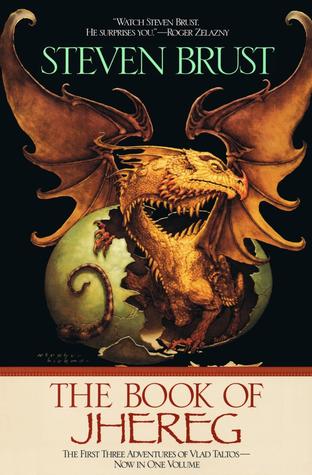 |
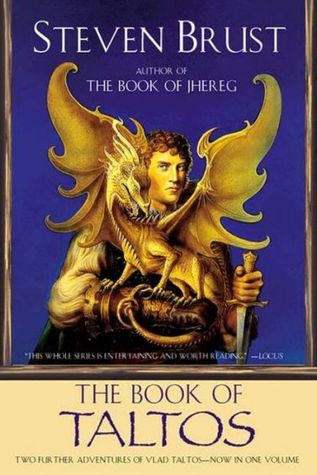 |
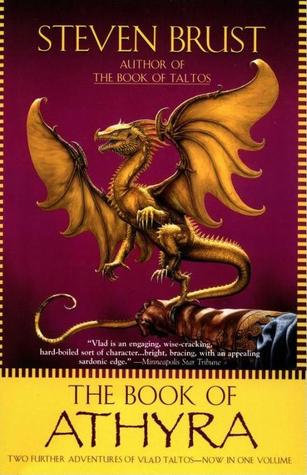 |
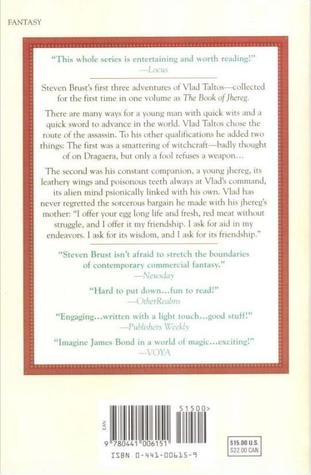 |
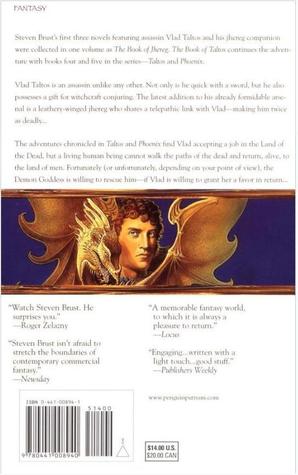 |
 |
The omnibus editions of The Adventures of Vlad Taltos from Ace Books, collecting
the first seven volumes: The Book of Jhereg (1999), The Book of Taltos (2002), and
The Book of Athyra (2003). Covers by Stephen Hickamn, Kinuko Y. Craft, Ciruelo Cabral
Here’s a taste from Bill’s review.
Vlad Taltos is human in a world of Dragaerans, which are similar to Moorcock’s Melnibonéans in that they are faster and more powerful, magically superior, and longer-lived than mere humans. The Dragaerans belong to one of seventeen great Houses, each named for an animal and each associated with certain characteristics: the Dzur, for example, embody their lion-like namesake’s nobility and physical strength, while the peasant-class Teckla are as meek and fertile as the rodent for which they are named. Vlad is a Jhereg, one of the few humans admitted into a Dragaeran House, and he worked as an assassin (less odious a profession in a world of reliable resurrections) and thief for his mafia-like House. That is, until he crossed them. Vlad, a human in a world of ‘elfs,’ relies on his wits to survive, and Brust’s convoluted and action-packed plots usually always have a satisfying intellectual component that place them above run-of-the-mill adventure fantasy.
Our previous coverage of Steven Brust includes:
Steven Brust’s Jhegaala by Bill Ward (2009)
A Review of Jhereg by Isabel Pelech (2010)
A Hero in the Service of Organized Crime: Jhereg by Fletcher Vredenburgh (2013)
A Rogue’s Early Days: Yendi by Fletcher Vredenburgh (2014)
New Treasures: Hawk (2014)
The Omnibus Volumes of Steven Brust: The Adventures of Vlad Taltos (2015)
The Skill of our Hands, Book 2 of The Incrementalists, by Steven Brust and Skyler White (2016)
Steven Brust’s Five Roger Zelazny Books that Changed his Life (2017)
Vallista (2017)
Good Guys (2018)
To Reign in Hell was published in hardcover by SteelDragon Press in June 1984, and reprinted in mass market by Ace Books in May 1985. The paperback edition is 284 pages, priced at $2.95. The cover is by Stephen Hickman.
See all our recent Vintage Treasures here.
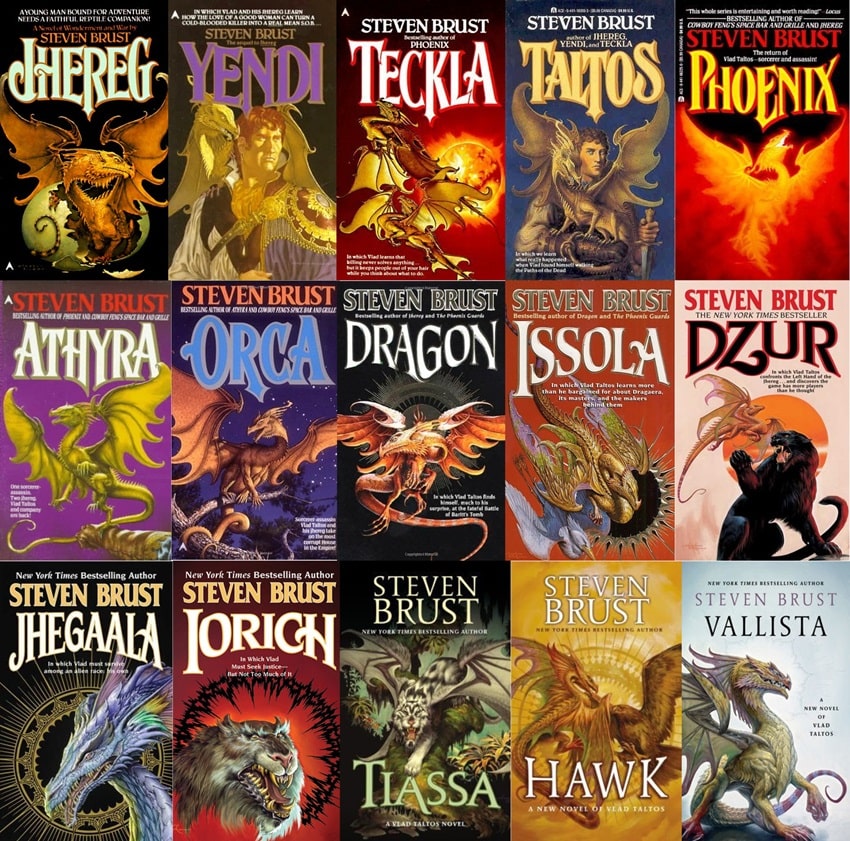
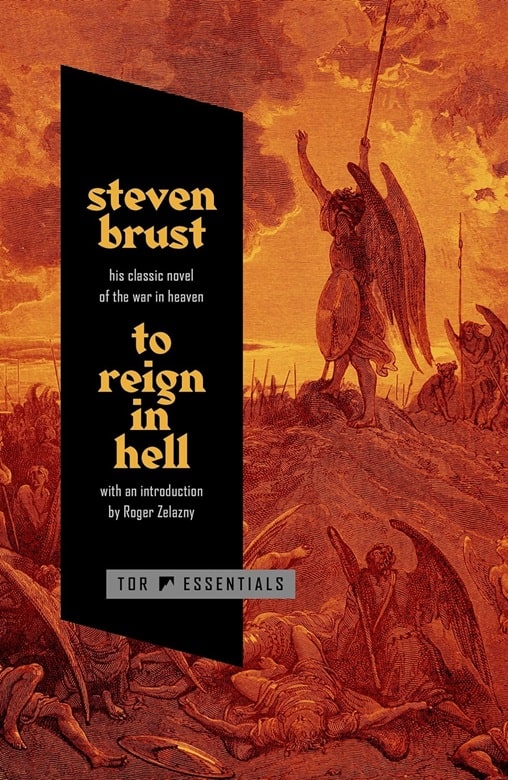
The 16th book, Lyorn, just came out. And you might have mentioned his five book rewriting of The Musketeers saga in the world of Vlad Taltos: The Phoenix Guards and its sequels.
I am more than overdue for a massive Brust reread and catch-up one of these days; especially since most of his books have such a … civilized word count to them.